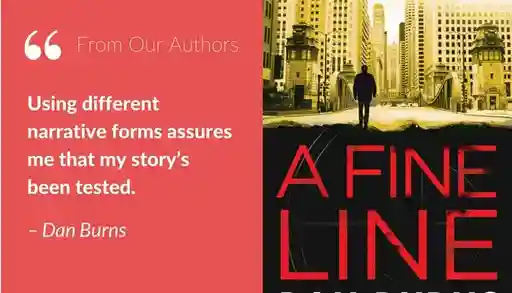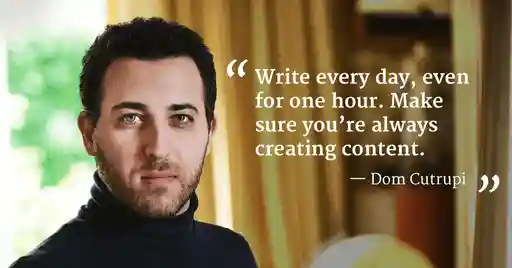Last updated on Oct 15, 2025
How My Editor Helped Me Understand Historical Fiction
Martin Cavannagh
Head of Content at Reedsy, Martin has spent over eight years helping writers turn their ambitions into reality. As a voice in the indie publishing space, he has written for a number of outlets and spoken at conferences, including the 2024 Writers Summit at the London Book Fair.
View profile →Dan Cross' debut novel, Caesar of Mercenaries, has been shortlisted for the 2018 Wilbur Smith Adventure Writing Award. In this post, he talks about the responsibility historical fiction writers have when it comes to blending fact and fiction — and the advice his editor ultimately gave him that set him on the path to success.
I have long possessed a fascination with history. I find it incredible how extraordinary events can be traced back, sometimes hundreds of years, to seemingly innocuous moments.
Even more fascinating: some of these moments are due to the actions of one person or a small group who remain relatively unknown today. To me, these men and women are the lost champions of human history, and I delight in using my other passion, writing, to bring them into contemporary consciousness and to give them personalities worth remembering.
Historical fiction is enjoying something of a resurgence in popular media today, including television and video gaming. But in no other medium is it more prevalent than the written word. From Ken Follett’s The Pillars of the Earth to Phillipa Gregory’s The Other Boleyn Girl, there are countless examples of authors reimagining past lives and events to create an entertaining and educational story.
Caesar of Mercenaries
In 2017, I learned of Captain Roger de Flor: a Templar who became a pirate, and then later the Megas Doux (or Caesar) of Constantinople. Reading the little information in the historical record, I became fascinated by this man and his adventures across the world. I wondered why Hollywood hadn’t made a movie about him yet, and then became excited about the prospect that I could be the one to tell his story. (You can read the synopsis for Caesar of Mercenaries here).

However, as my first foray into historical fiction, I became concerned about where I should draw the line between truth and invention. After all, so much of Roger’s life is unknown, and much of what historical fiction authors do is from an unreliable narrator. Telling a complete and exciting story would require me to invent details to at least a degree.
How accurate must historical fiction be?
This is a question that divides writers of historical fiction: one side argues tampering with historical facts is a betrayal of the readers’ trust, while the other side promotes a good story above all else.
But the lines of this debate are blurry: can fictional characters interact with historical ones? After all, that’s not what happened in reality. If your plot revolves around some fictional event, can the historical characters participate or even acknowledge it?
I know of few books that are so exclusive. Heck, half the fun of writing historical fiction is imagining what might happen if a historical character should participate in an imagined plot, or, conversely, how a fictional character might influence a historical event. You can do this without rewriting large parts of history and it can serve to help your story reach a wider audience while still being educational.
For instance, until watching the TV series Vikings, I had not known Rollo was the first Viking ruler of Normandy. In the series, Rollo is portrayed as the brother of the series’ protagonist, Ragnar Lodbrok, and the two battle alongside one another from the beginning. Yet, even if we presume Ragnar did exist (he probably didn’t), Rollo could never have fought beside him as their historical timelines do not match up. Yet, were it not for Rollo’s entertaining interpretation in the series, I may never have learned his true history.
Beware the exposition dump: use an editor
Despite coming to a reasoned decision that historical fiction can legitimately manipulate small aspects of history, I still wanted to make a clear distinction between fact and fiction in my novel. Much of this has been achieved with the inclusion of an appendix. However, I was still fearful my readers would not find the story believable.
Cue the inclusion of huge amounts of exposition as I described the complexities of the global politics at the time and how they related to Roger and his companions. I knew I was doing it, but I could see no other way to anticipate future readers’ potential concerns.
Fast forward one year and I had completed the first draft of Caesar of Mercenaries. The next step was to find an editor — in particular, someone who could help me take a top-down view of my entire project. I am the only writer in my family and, at the time, knew no-one in the industry (unless you count the Waterstones where I used to work).
Instead, I searched online, where I discovered Reedsy. In the click of a button, I went from having zero editors to choose from, to pages of them. I filtered them by genre, summarised the five who best stood out from their reviews and work history and, before the hour was out, I was emailing them for quotes.
I ended up choosing Michael Rowley. We had actually spoken briefly the year before regarding another manuscript I had written, but it was his experience and historical knowledge which ultimately helped me decide.
Michael completed a developmental edit of my manuscript and helped me understand how to make it more engaging. Not least of which, he identified the mountains of exposition for what they were — my attempt to anticipate history pedants — and instead encouraged me to prioritise writing a gripping story; one which excites the reader, even if at the expense of some historical detail. In other words, to write the story I wanted to tell; not one which I thought some readers would demand.
As history lovers, we want to be as faithful to events and characters as possible; but we should not be bound by this. Besides, there is always the appendix and Wikipedia for the die-hard historians who want to learn more. Like Vikings stimulated me to learn more about Rollo, I hope readers of Caesar of Mercenaries will be encouraged to learn more about Roger de Flor after they put the novel down.
Wilbur Smith Adventure Writing Prize
And it would seem this strategy is a positive one for historical fiction authors. Once Michael and I finished working together, he encouraged me to enter my novel into the 2018 Wilbur Smith Adventure Writing Prize (Best Unpublished Manuscript).
In May 2018, out of over 250 manuscripts from more than 30 countries, the Wilbur & Niso Smith Foundation announced that Caesar of Mercenaries had been shortlisted.

Currently, I am making final edits to the novel before the winner is announced in September. The selected author will be awarded £7,500 towards researching their next novel and, potentially, representation with a literary agent. I remain hopeful that this is the first step on the road towards publication, so you and other readers can soon enjoy Roger’s adventures.
While historical accuracy is a crucial element of the genre, first and foremost, a story must be engaging if an audience is going to read it. Had I remain rigidly attached to the idea of historical fact, I would only have succeeded in appeasing a small selection of history experts. By striking a balance between fact and fiction, I have completed a novel which is far more likely to entertain a wider range of readers, simultaneously educating them about this interesting man who would otherwise remain lost to time.
Are you a historical fiction writer who's straddled the line between fact and fiction? Leave any questions or comments for Dan Cross in the comments below!








2 responses
Millie Mellgren says:
23/08/2018 – 17:25
I have been struggling with this very issue, mingling fact and fiction. Thank you for your insight. I especially like the part about imagining the actual historical figures doing certain things. My character (actual person) had interactions with Ambassador Harriman and General Eisenhower during WWII in Moscow and I’ve been wrestling with keeping truth intact while making the story flow in an interesting manner. I like the idea of exploring the “what if’s.”
↪️ Dan Cross replied:
23/08/2018 – 19:10
Hi Millie. I am so glad you found the article useful. It's a real conundrum and, in the end, comes down to a matter of taste. The way I look at it is, at the end of the day, this is your story and only you can tell it your way, so go with what feels right. That fact that you so desperately want to respect history means that you will, so make sure not to neglect the story, too. Oh, and the all important mantra - if you find your story entertaining, you can be certain someone else will, too. Good luck with your book, and shout loudly and proudly if/when you publish, so we can all enjoy it, as well :-)